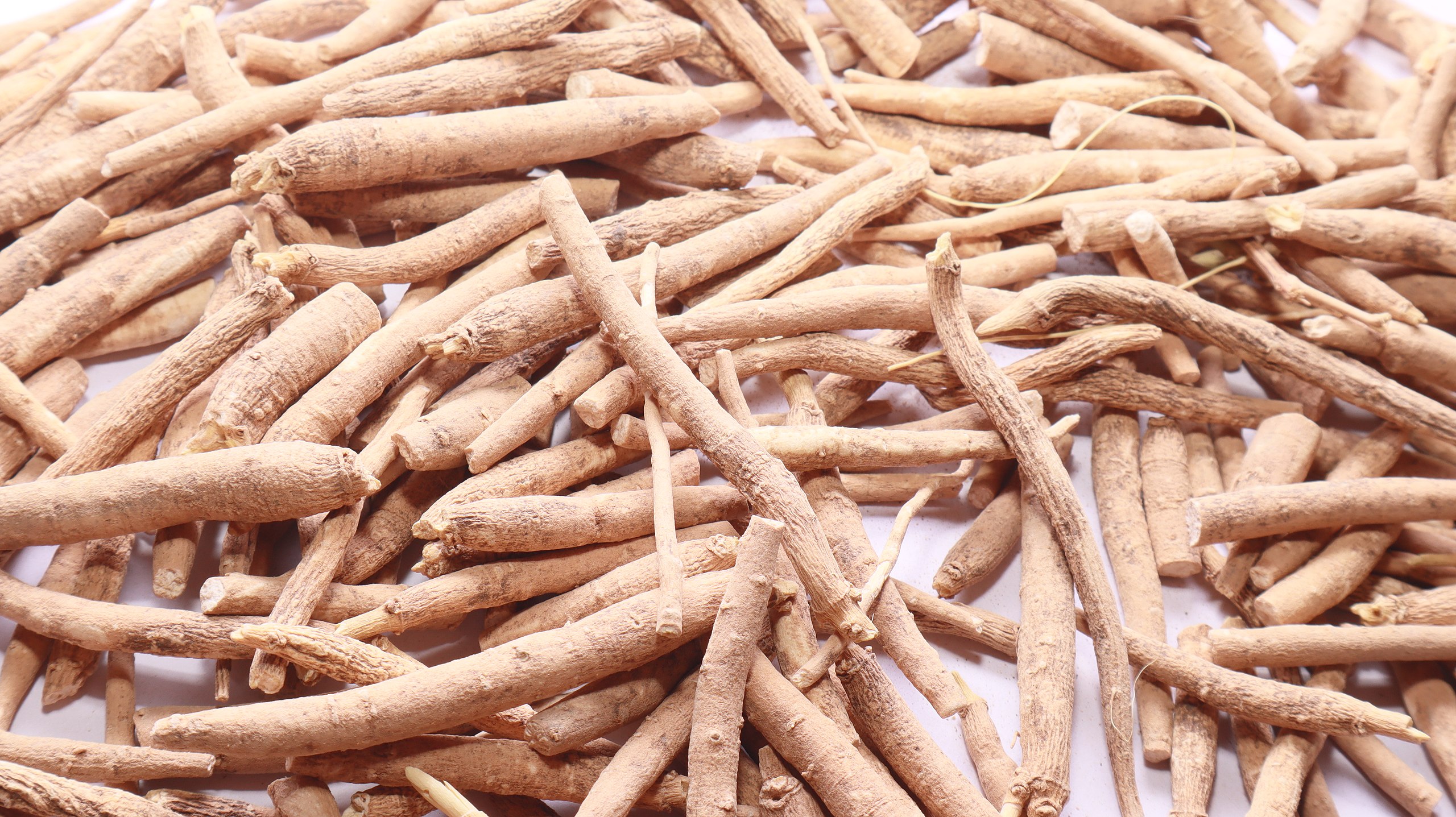In this article, Health Stores UK partner Olivit explores the history and well-evidenced benefits of ashwagandha used as a natural remedy for a host of conditions and health support.
Stress can be overwhelming, impacting everyone to some degree, and it cannot be entirely eradicated. However, it’s wise to explore effective ways of managing it, ideally with the assistance of natural remedies. It’s valuable to delve deeper into the world of adaptogens, particularly one that has been used for centuries to reduce anxiety, enhance sleep quality, and boost immune system function. We’re referring to ashwagandha, a well-recognized remedy today.
What Is Ashwagandha?
Ashwagandha is a plant from the Solanaceae family, also known as Withania somnifera, Indian ginseng, Indian winter cherry, or winter cherry. Due to the recent trend towards natural methods of improving well-being, ashwagandha has become one of the more popular adaptogens on the market. This means it can help the body reduce the negative effects of stress.
It’s important to know that ashwagandha has a long history. It’s cultivated in the northwestern and central parts of India and has been used for over 3,000 years in indigenous cultures to alleviate various ailments. The name “ashwagandha” is a combination of two words, “ashwa” (horse) and “gandha” (smell), which refers to both the root’s fragrance and its effects – it’s said to provide the strength of a horse. Additionally, the Latin name “somnifera” means “inducer of sleep,” emphasising ashwagandha’s positive impact on the quality of rest. For millennia, this plant has been used in Ayurveda as a Rasayana – a substance that promotes youthful physical and mental health [1, 2, 3].
Why Choose Ashwagandha Root Extract as a supplement?
The plant’s roots are rich in biologically active chemical compounds, including:
- alkaloids (e.g., somniferine, withanine),
- steroidal lactones (withanolides, withaferins),
- saponins,
- flavonoids.
It’s worth noting that the root of ashwagandha shows the most potential. This is supported by both the traditional use of the plant (only the root was used for internal consumption in the past) and the fact that the majority of research on ashwagandha focuses on the root and root extracts.
There is no evidence that a combination of root and leaf extracts provides a similar adaptogenic value as pure root. However, because ashwagandha leaves are cheaper than the root, dishonest practices of adulterating extracts with leaves can be found in the dietary supplement market. Including the above-ground parts of the plant in extracts undermines the effectiveness and safety of using ashwagandha. Therefore, it’s essential to choose supplements that are made only from the root of Indian ginseng.
Ashwagandha – What Does It Help With?
Ashwagandha has a multi-faceted action. It supports cognitive functions, immunity, and healthy sleep. Most notably, its anti-stress properties affect the above.
The most crucial properties of ashwagandha are:
- adaptogenic/anti-stress,
- cognitive function-enhancing,
- maintaining proper nervous system function,
- anxiolytic (mood-stabilising),
- energy-boosting,
- anti-inflammatory,
- antioxidant,
- antibacterial,
- immunomodulatory,
- cardioprotective,
- analgesic (pain-relieving),
- and sleep-improving properties.
Ashwagandha for Stress and More
Ashwagandha is often described as a herb with anti-stress properties, even rejuvenating and mood-enhancing (Rasayana). This adaptogen increases the body’s resistance to stress, has an anxiolytic effect, and enhances cognitive functions. Ashwagandha is also known as a regenerative tonic that can be used for conditions like physical weakness, insomnia, joint discomfort, or edema. Interestingly, it can also combat boils and acne. The broad spectrum of ashwagandha’s action makes it suitable both as a preventive measure against stress-induced disorders and as a support for already existing issues due to stress. It has been demonstrated to support the body in cardiovascular conditions, premature ageing, as well as metabolic and joint disorders.
Studies have shown that taking ashwagandha in combination with relaxation techniques can reduce anxiety levels. The group taking Indian ginseng showed improved concentration, increased vitality, an improved quality of life, and positive changes in overall social functioning.
Ashwagandha and the Nervous System
The impact of Withania somnifera on brain function cannot be overlooked. Ashwagandha promotes cognitive functions by improving immediate and overall memory, executive functions, attention, and information processing speed. It is used in children and older people with memory deficits or loss. This herb supports the body in neurodegenerative conditions. It has also been found to improve mitochondrial condition and increase energy levels.
Ashwagandha – Enhancing the Body’s Immunity
Research shows that ashwagandha stimulates the immune system by affecting both innate and adaptive immunity. Its immunomodulating action has been demonstrated by a significant increase in hemolytic antibody responses to human erythrocytes during the use of Indian ginseng. Additionally, Withania somnifera has antioxidant properties, protecting cells from damage caused by free radicals.
Take Care of Your Sleep and Physical Fitness with Ashwagandha
The quality of sleep is significantly influenced by the daily stress levels and the ability to cope with them. Ashwagandha’s anti-stress properties are essential for healthy sleep. Lowering anxiety levels has a positive impact on sleep quality and overall mood. It has also been shown that adaptogenic action can improve physical fitness, influencing strength, cardiorespiratory fitness, regenerative processes, and fatigue.
What You Should Know About Ashwagandha Before Supplementing?
Ashwagandha is considered a safe dietary supplement. However, it’s essential to follow the manufacturer’s recommendations, primarily not to exceed the recommended daily dose. Indian ginseng should not be combined with sedative, hypnotic, and antiepileptic medications. It should not be used by pregnant and lactating women or children.
[1] Zahiruddin, S. et. al. (2020). Ashwagandha in brain disorders: A review of recent developments. Journal of ethnopharmacology, 257, 112876.
[2] Singh N. et. al. (2011). An overview on ashwagandha: a Rasayana (rejuvenator) of Ayurveda. Afr J Tradit Complement Altern Med.; 8(5 Suppl):208-13. doi: 10.4314/ajtcam.v8i5S.9. .x;
[3] Joshi V. K., & Joshi, A. (2021). Rational use of Ashwagandha in Ayurveda (Traditional Indian Medicine) for health and healing. Journal of Ethnopharmacology, 276, 114101
[4] ClinicalTrial.gov. NIH. National Library of Medicine. Pobrano 13.09.2023 z https://clinicaltrials.gov/
[5] ANZCTR. Australian New Zealand Clinical Trials Registry. Pobrano 13.09.2023 z https://anzctr.org.au/TrialSearch.aspx
[6] IRCT. Iranian Registry of Clinical Trials. Pobrano 13.09.2023 z https://www.irct.ir/search
[7] Clinical Trials Registry – India. ICMR – National Institute of Medical Statistics. Pobrano 13.09.2023 z https://ctri.nic.in/Clinicaltrials/advancesearchmain.php
[8] Gupta G. L., & Rana A. C. (2007). PHCOG MAG.: Plant review Withania somnifera (Ashwagandha): A review. Pharmacognosy Reviews, 1(1), 129-136
[9] Tharakan A. et. al. (2021). Immunomodulatory Effect of Withania somnifera (Ashwagandha) Extract-A Randomized, Double-Blind, Placebo Controlled Trial with an Open Label Extension on Healthy Participants. J Clin Med.; 10(16):3644. doi: 10.3390/jcm10163644
[10] Choudhary D. et. al. (2017). Efficacy and Safety of Ashwagandha (Withania somnifera (L.) Dunal) Root Extract in Improving Memory and Cognitive Functions. J Diet Suppl.; 14(6):599-612. doi: 10.1080/19390211.2017.1284970.
[11] Carr AC, Maggini S. (2017). Vitamin C and Immune Function. Nutrients; 9(11):1211. https://doi.org/10.3390/nu9111211
[12] Ziauddin M. et. al. (1996). Studies on the immunomodulatory effects of Ashwagandha. Journal of ethnopharmacology, 50(2), 69-76.
[13] Cheah KL. et. al. (2021) Effect of Ashwagandha (Withania somnifera) extract on sleep: A systematic review and meta-analysis. PLoS ONE 16(9): e0257843. https://doi.org/10.1371/journal.pone.0257843
[14] Jack O’Connor. et. al. (2022). The Impact of Ashwagandha on Stress, Sleep Quality, and Food Cravings in College Students: Quantitative Analysis of a Double-Blind Randomized Control Trial. Journal of Medicinal Food. 1086-1094.http://doi.org/10.1089/jmf.2022.0040
[15] Chai S. et. al. (2020). Effects of Four-Week Supplementation of Ashwagandha and B-Vitamins on Mood and Stress Relief. Current Developments in Nutrition, 4(Supplement_2), 1195-1195
[16] Bonilla DA. et. al. (2021). Effects of Ashwagandha (Withania somnifera) on Physical Performance: Systematic Review and Bayesian Meta-Analysis. Journal of Functional Morphology and Kinesiology; 6(1):20. https://doi.org/10.3390/jfmk6010020
[17] Uchwała nr 7/2020 w sprawie wyrażania opinii dotyczącej stosowania Withania somnifera (L.) Dunal jako składnika suplementów diety. (2020). Zespół Do Spraw Suplementów Diety
[18] Ashwagandha in dietary supplement products. Operation supplement safety. Pobrano 28.08.2023 z ashwagandha in dietary supplement products (opss.Org)
Image: Piyush Kothari. Used under Creative Commons licence.



